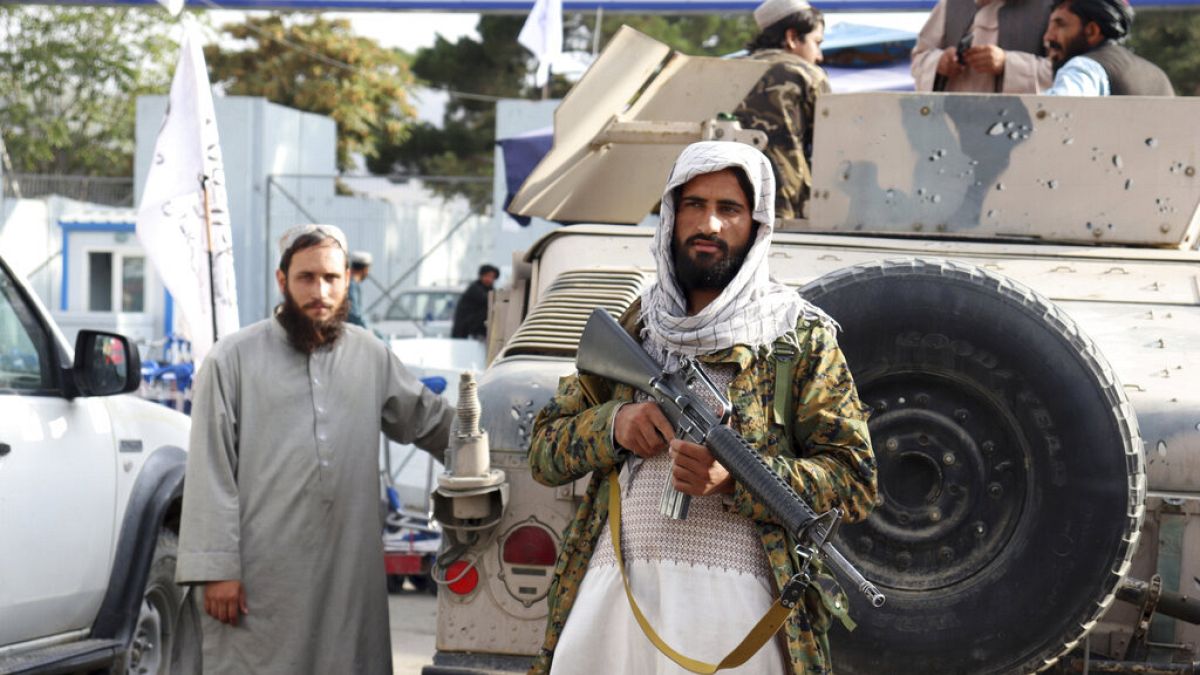A Euronews reporter witnessed first-hand Taliban leaders taking over Kabul airport and celebrating their victory after the last US soldiers flew out of Afghanistan.
Taliban leaders took control of Kabul's airport on Tuesday after the last US troops left Afghanistan.
The country's new rulers now face the challenge of governing a nation of 38 million people beset by multiple crises, including security problems, an economy in tatters, medical supply issues and a potential diplomatic freeze.
“We all are working on all those necessary needs and issues to resolve," said Taliban leader Anas Haqqani, speaking to reporters at the Kabul airport. "You will see as we were waiting for this day, the cabinet will be announced in the coming days if Allah permits."
Euronews filmed at the airport hours after final US soldiers left the country as Taliban leaders symbolically walked across the runway, while flanked by fighters of the insurgents' elite Badr unit.
“We are in a process to calculate and assess how many people we need here (at the airport) if we can spare our own technical teams here, we will not need any assistance, however, if our technical people can’t handle the situation, we will definitely take assistance,” Taliban spokesperson Zabihullah Mujahid said.
The group was then in full control of the airport and vehicles raced back and forth along the Hamid Karzai International Airport's sole runway on the northern, military side of the airfield.
Before dawn broke, heavily armed Taliban fighters walked through hangars, passing some of the seven CH-46 helicopters the US State Department used in its evacuations before rendering them unflyable.
Euronews footage showed Mujahid giving a speech to the Badr unit as they stood in uniform brandishing military rifles, flying the Taliban's Islamic Emirate of Afghanistan flag. Other military equipment left behind by Western forces was visible, with decommissioned jets and helicopters littered on the airport runway.
“The world should have learned its lesson and this is the enjoyable moment of victory," Taliban Mujahid said earlier in a live stream posted by a militant.
Taliban fighters draped their white flags over barriers at the airport as others guarded the civilian side of the airfield. Inside the terminal, several dozen suitcases and pieces of luggage were left strewn across the floor, apparently left behind in the chaos. Clothes and shoes also were scattered. A poster of Ahmad Shah Massoud, the famed anti-Taliban fighter, had been destroyed.
“After 20 years we have defeated the Americans," said Mohammad Islam, a Taliban guard at the airport from Logar province, cradling a Kalashnikov rifle. “They have left and now our country is free.”
“It’s clear what we want. We want Shariah (Islamic law), peace and stability,” he added.
Economy, health and diplomacy
But the celebrations could be short-lived as the Taliban face multiple crises.
On Tuesday, UN Secretary-General Antonio Guterres warned of a humanitarian "catastrophe" in Afghanistan and called for humanitarian assistance in a statement.
Last week, an Islamic State suicide attack at an airport gate killed at least 169 Afghans and 13 US service members. The jihadist group also launched six rockets towards the airport on Monday.
The economy — already one of the poorest in the world — lies in tatters as crucial international funds have dried up since the Taliban's breathtaking sweep across the country.
Both the IMF and World Bank have suspended payments. The EU and Germany have frozen development funds to the country — worth over a billion euros over the next seven years — until they say the Taliban can fulfil certain conditions, notably on human rights.
The majority of the billions of dollars Afghanistan holds in foreign reserves is now frozen in America, pressuring its now-depreciating Afghani currency. Banks have implemented withdrawal controls, fearing runs on their deposits in the uncertainty. Civil servants across the country say they haven't received their salary in months.
The group had also urged the US and their allies not to evacuate "Afghan experts", suggesting they fear a brain drain. Overall, 123,000 people were flown out of the country between August 14 and August 31, most of them Afghans who worked with the international community over the past two decades.
Medical equipment remains in short supply, while thousands who fled the Taliban's advance remain living in squalid conditions. A major drought also has cut into the country's food supplies, making its imports even more important and raising the risk of people going hungry.
The Taliban may also struggle to form solid diplomatic relations despite a spokesperson reiterating on Tuesday that they want "good relations" with Washington.
The group of seven biggest industrialised nations stressed following an extraordinary summit last week that they would "judge the Afghan parties by their actions, not words" and that the Taliban "will be held accountable for their actions on preventing terrorism, on human rights, in particular, those of women, girls and minorities and on pursuing an inclusive political settlement in Afghanistan."
"The legitimacy of any future government depends on the approach it now takes to uphold its international obligations and commitments to ensure a stable Afghanistan," the G7, which comprises Canada, France, Germany, Japan, the UK, and the US, added.
The Taliban have sought to soften their image, promising no retribution against Afghans who had worked with the international community and allowing women to continue working "within Islamic law". They also said they would bring the production of opium — from which they derived a lot of their revenues in the past 20 years — back to zero.
During its brutal rule from 1996 to 2001, the Taliban regime was only recognised by Pakistan, Saudi Arabia, and the UAE.
